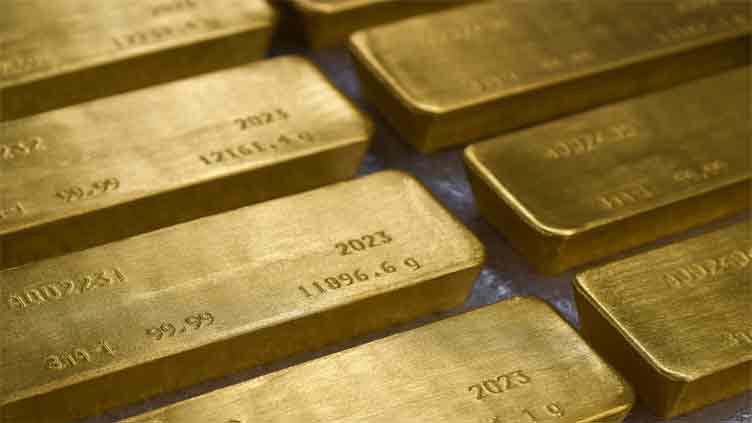Unease among investors about the risk of a widening conflict in the Middle East translated into a rise in the prices of oil and gold on Wednesday as the prospect of no respite any time soon from punishingly high interest rates, following US data that showed consumer spending picked up in September, compounded the concern.
By the time this report was filed around 2:20pm [Pakistan Standard Time], Brent rose 2.40 per cent to $92.06 a barrel, while the US crude (WTI) jumped 2.58pc to $88.90.
It means the oil prices traded around two-week peaks, driven by concerns over the Middle East and data showing a fall in crude stocks.
On the other hand, flows in safe haven assets lifted gold price 0.8pc to $1,938.39 an ounce, well above its recent trough of $1,809.
Meanwhile, bond markets took a battering the previous day, after US retail sales increased more than expected last month, cementing expectations that economic growth picked up more than expected in the third quarter.
Furthermore, China reported annual economic growth of 4.9pc in the third quarter, beating forecasts for 4.4pc. Separate releases there painted a picture of a more resilient consumer, suggesting Beijing’s stimulus measures may be paying off.
Investor sentiment was fragile, as Israeli and Palestinian authorities traded blame for the blast that killed hundreds at a Gaza hospital, complicating U.S. President Joe Biden’s already fraught trip to the region.
The news helped push oil above $90 a barrel and fed a bid for gold, which usually struggles when bond yields rise, but did not overshadow the outlook for interest rates and inflation as the driving force for markets on Wednesday.
“The dominant force remains this reality of inflation and what it means for central banks and how US exceptionalism keeps alive the risk of upsetting the Fed down the road,” Lombard Odier chief economist Samy Chaar said.
“The dollar is not sharply on the rise and is relatively stable. The only thing is bond yields – in geopolitical stress you would expect bond yields to go down as a safe haven, the reality is bond yields have gone up.”
Money markets show traders are betting more heavily on the Federal Reserve being forced to raise rates again, having recently signalled it may not need to do so. A move in November is still seen as just an 11pc chance, but the probability for January climbed to 50pc from 37pc.
The market also again scaled back expectations for early rate cuts, with no chance of a move until June and around 54 basis points of easing implied for all of 2024.
GLOOM IN TECH STOCKS
Stocks retreated on Wednesday. The MSCI All-World index eased 0.1pc, while in Europe, the STOXX 600 fell 0.2pc.
Tech stocks, which tend to suffer if interest rates rise, came under pressure. Adding to the drag on the sector was a drop on Tuesday in shares of Nvidia after news the Biden administration plans to halt shipments to China of more of its advanced artificial intelligence chips.
Dutch semiconductor maker ASML was among those weighing most on the European market, down 1.1pc after warning of flat sales in 2024.
Markets are now awaiting earnings from Netflix and Tesla later in the session.
Government bonds, meanwhile, attempted to recoup some losses. Yields on the two-year Treasury note, which rose by as much as 14 basis points to a 16-year high at one point on Tuesday, were down 2 bps on the day at 5.193%.
Ten-year yields were flat at 4.851pc, having closed 11 bps higher the day before.
The Bank of Japan was forced to conduct an unscheduled operation to buy JGBs to restrain a rise in yields, while in the euro zone, German 10-year yields rose for a third day, up 2.5 bps at 2.907pc.
More Fed comments are likely on Wednesday, with five officials scheduled to speak ahead of an appearance by Chair Jerome Powell on Thursday.
“We are in an environment where bad news is good news and good news depends on whether it’s good enough to push the Fed,” Jefferies strategist Mohit Kumar said.
“We are still in the camp of modestly long positions in risky assets. But we are keeping positions close to home given the geopolitical uncertainty,” he added.
The rise in yields kept the US dollar steady against a basket of currencies.
Post Views: 101


 Sports3 months ago
Sports3 months ago
 Fashion3 months ago
Fashion3 months ago
 Sports3 months ago
Sports3 months ago
 World3 months ago
World3 months ago
 World3 months ago
World3 months ago
 Sports2 months ago
Sports2 months ago
 Sports2 months ago
Sports2 months ago
 World3 months ago
World3 months ago






















